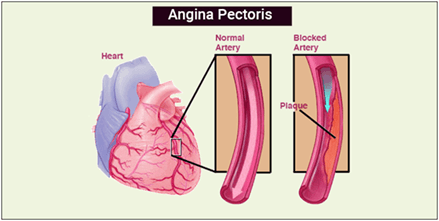Contents
- What is Angina?
- What causes Angina?
- What are the Risk Factors for Angina?
- How does Angina Feel?
- Managing risk factors
- How is Angina Treated?
- What I do for Angina?
- When Should I Call My Doctor?
What is Angina?
Angina is chest pain or discomfort. It happens when your heart isn’t getting enough oxygen. It can be caused by physical exertion, emotional stress, exposure to very hot cold temperatures, heavy meals and smoking. Angina is not a heart attack, but it does mean that you are at greater risk of having a heart attack than someone who does not have angina.
What causes Angina?
Angina is a symptom that occurs from a temporary lack of oxygen to the heart muscle. This is most often caused by coronary artery disease, a common type of heart disease which leads to Atherosclerosis, or ‘hardening of the arteries’. This is a build-up of fatty deposits in the arteries, making them narrow. This can prevent blood (and therefore oxygen) from getting to the heart muscle.
What are the Risk Factors for Angina?
- Smoking
- Lack of Exercise
- Being Overweight
- High Blood Pressure
- High Cholesterol
- Diabetes
- Family History
How does Angina Feel?
Different people experience angina differently. It has been described as many different feelings including:
- Tightness, pressure or squeezing and/or an aching feeling in the chest or arm (s)
- Persistent indigestion
- Burning or cramping pain
- Aching in the neck, jaw, throat, shoulder, back or arm (s)
- Discomfort in the neck or upper back, especially between the shoulder blades
Other symptoms may include:
- Nausea
- Fatigue
- Shortness of breath
- Sweating
- Light-headedness or weakness
How is Angina Treated?
Managing risk factors
- No smoking
- Weight Control
- Exercise
- Maintain normal cholesterol
- Control Diabetes
- High Blood Pressure
How is Angina Treated?
Your doctor may prescribe different types of medications to help treat angina.
These may include:
- Nitrates (e.g. Nitroglycerine): These drugs dilate (open-up) blood vessels to increase blood supply to the heart. Nitrates can be given under the tongue or as pills or patches.
- Beta Blockers: These drugs slow down the heart rate and lower blood pressure.
- Calcium Channel Blockers: These drugs reduce strain on the heart and may also reduce risk of future heart attack and heart failure.
- ACE Inhibitors: These drugs reduce the strain on the heart and may also reduce the risk of future heart attack and heart failure.
- ASA (e.g. Aspirin):
Aspirin prevents platelets (tiny cells in the blood) from clumping together and forming clots which can block arteries.
Angina may also be managed with Coronary Angioplasty or surgery. Your doctor will discuss any procedures you may need.
What I do for Angina?
- Sit or lie down. Rest may help your angina go away.
- Take your first dose of nitroglycerine (nitro) tablet or spray. Place the tablet under the tongue or spray the dose under the tongue.
- If you still have angina after three minutes, take a second dose.
- If your angina is still there after three or more minutes, take a third dose of nitro
- If your angina does not go away five minutes after the third dose, Call ‘911’ or the emergency number in your area.
**When Should I Call My Doctor?
Call your doctor for an appointment if you notice:
- Your Angina occurs more than often or becomes more severe.
- Your angina occurs with less exertion or when resting.
- Your angina wakes you up at night.
- Your nitro doesn’t work as fast as before.
Written by: Winter Rose
Copyright © by www.siyalla.com
[Earlier our website was www.ehealthut.com]

